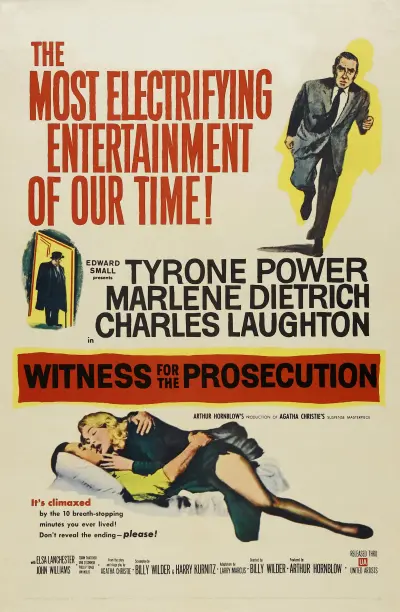
"Witness for the Prosecution" is a film that is known for its multitude of twists and turns, keeping viewers on the edge of their seats with its relentless suspense. Directed by the legendary Billy Wilder in 1957, this courtroom drama is an adaptation of Agatha Christie's play, which brings the story to life in a razor-sharp manner. Taking place in the intricate legal world of London, the film explores a murder trial that becomes a captivating exploration of both the legal system and human psychology.
The central character of the story is Leonard Vole, played by the charming Tyrone Power, who finds himself accused of murdering a wealthy older woman. Enter Sir Wilfrid Robarts, portrayed by Charles Laughton, a seasoned and health-challenged barrister who decides to represent Vole despite his initial reservations. Throughout the film, viewers are kept on the edge of their seats as new evidence emerges, including Vole's own wife Christine, played brilliantly by Marlene Dietrich, testifying against him. The dynamic between Vole and Christine, with her enigmatic loyalty and mysterious past, adds layers of intrigue to an already complex puzzle.
Themes in the film delve into the machinations of justice, the shortcomings of perception, and the moral ambiguity of truth. Each character appears to be playing a game of chess, withholding their moves until the thrilling conclusion. Christine, in particular, showcases a masterclass in duplicity, with her actions and motives underscoring the film's exploration of the extremes people may go to for love—or manipulation. The film continually asks: what is real and what is merely a façade?
Wilder's direction is truly masterful, creating tension through tight close-ups and razor-sharp dialogue. "Witness for the Prosecution" is not just a movie; it is a study of character armor. Each trial scene cuts through the characters' defenses, revealing the grit and grime beneath their polished exteriors. This stands in contrast to the British legal system, which is depicted as a venerable and decorous institution that is not immune to the passions and prejudices of the individuals within it.
In this film, nothing is as straightforward as it initially appears. The scenario is meticulously crafted to sustain the mystery, manipulate expectations, and challenge viewers' deductions. As the story unfolds, secrets are unraveled, and alibis are poked full of holes by the brilliantly enigmatic Sir Wilfrid, with each revelation propelling the narrative towards its next precipice. While the courtroom serves as the stage, the performance delves deep into the complexity of human desire and deception.
And that ending? No spoilers here, but the film's climax will leave you in awe. It flips the entire narrative on its head, showcasing the genius of both Christie and Wilder in creating an ending that feels both unexpected and inevitable. "Witness for the Prosecution" is a narrative sleight of hand, a film that combines the elements of a legal thriller with a profound meditation on the nature of guilt and innocence. Imagine yourself on a rainy evening, with your popcorn ready, and hit play to let "Witness for the Prosecution" lead you into its brilliantly woven web of deceit. It is vintage storytelling at its most cunning and entertaining.

